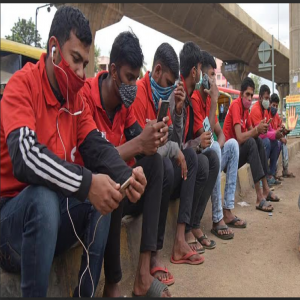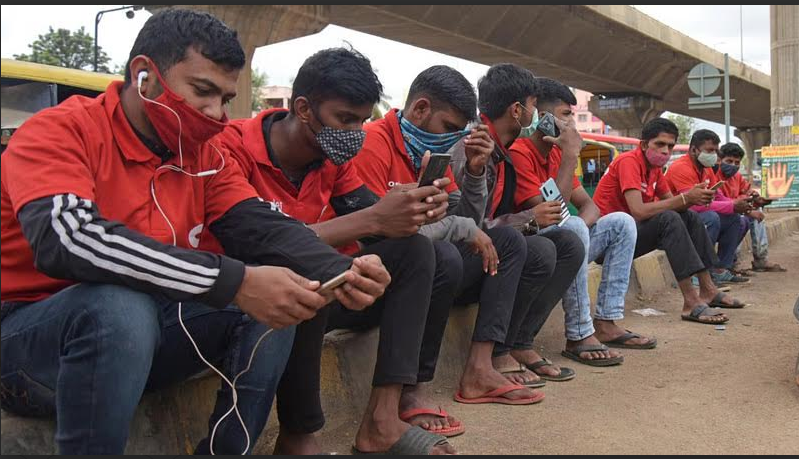

Unlimited memes and reels are circulating round-the-clock on various social media platforms, and those 'so-called' humorous clippings can indeed pose an obstacle to the development of a nation by eating away productive man-hours if not produced or viewed in moderation. The country has a hyper-connected population of around 1.2 billion mobile users with around 900 million internet users. Some reports peg average Indian social media use at 2.5 to 3 hours daily, with Generation Z (Gen Z), also known as 'Zoomers' and Millennials leading. These short, so-called humorous reels, which are quick, dopamine-driven, and algorithmically addictive, eat away a chunk of that online time spent. It captures massive attention, especially among the youth and even school-going children, who form a significant portion of the country's population.
It is common to see many youngsters, even gig workers, lying flat on their bikes parked under the tree shades or sitting on the platform and watching such videos even during normal working hours. Even office establishments are no less affected, for that matter. If 500 million young people spend an extra hour scrolling instead of doing some productive work, billions of productive hours are lost annually. Such an alarming trend hinders progress in areas like productivity, education, research work and whatnot, which are critical to national development.
Social media funny videos, with their accompanying throat-stripping laugh and terms like 'Oh, My God!' while often providing sarcastic amusement and a sense of false humour, can have more of a negative effect than positive effects. Such vexing reels can hardly be played in public places or while commuting unless one ignores or is mindless of others' frowning at the individual. If individuals, especially young people, spend excessive time watching such unproductive videos at the expense of studying, working, or engaging in productive activities, it could hinder not only personal development but even national development. IITs and IIMs churn out global talent, but the broader workforce lags, with only a meagre percentage of Indians being formally skilled – World Bank data backs this up as only 2.3%. Though memes do not cause that, they do not help either. This unchecked digital sprawl is a symptom of a bigger issue or obstacle, particularly for a nation that is racing to modernise.
It may be mentioned that funny video clippings and other reels distract people from more serious societal issues like politics, education, and health. If these distractions become overwhelming, they could contribute to a disengaged or misinformed population, which can negatively impact civic involvement and progress. Many such videos focus on trivial content, which may not contribute much towards intellectual or creative development. This could lead to a generation which is less focused on innovation or solving important challenges.
Laughter and humour are definitely known to have positive effects on mental health, but anyone getting glued to such unlimited content at the expense of their own studies or career is most dangerous not only to the individual's own mental and physical development but also acts as a barrier to national development even. Excessive scrolling might erode attention spans, making it harder to engage in deep, constructive tasks—think coding, research, or even civic participation. If a generation prioritises memes over learning, the country risks a lag in its human capital development, a key driver of economic growth in a country aiming to be a global tech and manufacturing hub.
As mentioned before, the hurdle is not the memes themselves but rather the absence of study or work-leisure balance. In a democratic set-up, free speech protections typically allow a wide range of humorous content, but if they dominate attention at the expense of education, innovation, or action, they could slow a nation's climb. If balance cannot be maintained, then the only course of action is to evolve a mechanism to charge heavily on such memes-makers, be it using Indian or foreign social media platforms and put a charge for circulating in social media.
Something like a 'distraction tax' could be imposed on domestic memes-makers. Since such influencers are making money out of their business at the behest of the younger generation's education and career, there should be no harm in imposing a 'distraction tax' for making such funny videos and circulating them, thereby adding to the public exchequer. The introduction of a 'distraction tax' seems like a good option, as imposing a ban on producing and circulating such memes is not possible in a democratic set-up. In fact, such memes-makers should themselves make an attempt to behave in a responsible and disciplined manner by restricting the production of such memes and thus desist from contributing to the enormous amount of productive hours being wasted and thereby contributing their own bit to the nation's development.